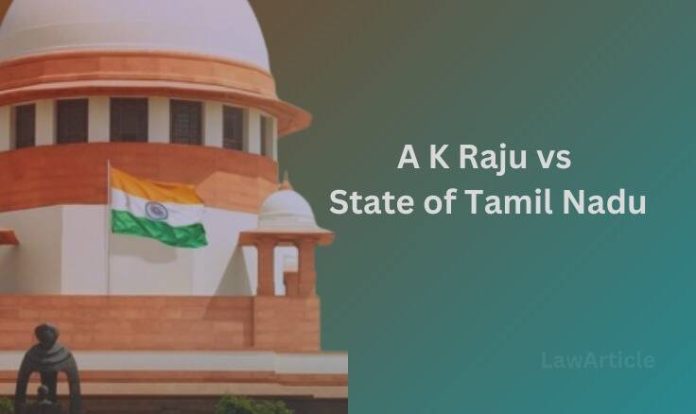A K Raju vs State of Tamil Nadu 2002
Date of Decision: 01-12-2004
Citation : (2005) CriLJ 978 : (2005) 1 MLJ 448
Hon’ble Judges: Justice P D Dinakaran, Justice F M Ibrahim Kalifulla
Bench: Division Bench
Advocate: V.S. Sethuraman, Spl. Govt. Pleader, Goutham,
Facts :
The case of A.K. Raju vs. State of Tamil Nadu (2002) is a landmark decision by the Supreme Court of India that addresses significant issues regarding the enforcement of laws related to the preservation of forests and the rights of indigenous communities. The judgment highlights the balance between environmental conservation and the rights of local populations, particularly in the context of forest management.
Background of the Case
The case began with a conflict between the Tamil Nadu government and certain individuals, including A.K. Raju. They were accused of illegal encroachments and activities in forest lands. The state had passed a law to prevent unlawful encroachments and to protect forest areas, which are important for maintaining ecological balance and biodiversity. The law aimed to stop deforestation and safeguard forest resources from exploitation and misuse. A.K. Raju and others challenged the constitutionality of the law and the actions taken by the state government. They argued that the measures violated their rights. They claimed that the state’s actions were arbitrary and infringed upon their fundamental rights, particularly regarding land use and the rights of those who had historically lived in and around forest areas.
Key Issues in the Case
1. Legal Considerations for Forest Management: The main legal issue was whether the measures taken by the Tamil Nadu government to prevent illegal encroachments and preserve forests were carried out within the boundaries of legal authority and executed fairly.
2. Constitutional Rights: The case also brought into question the constitutional rights of individuals, particularly those residing in forest areas. The appellants argued that the state’s actions infringed upon their fundamental rights, including the right to livelihood and the right to property.
3. Balancing Environmental Protection and Individual Rights: A key aspect of the case was the conflict between environmental conservation and the rights of local populations. The court had to weigh the importance of protecting forest resources against ensuring that the rights of individuals were not unjustly violated.
The Supreme Court’s Judgment
The Supreme Court, in its judgment, upheld the validity of the Tamil Nadu Forest Act and the measures taken by the state government. The Court emphasized the importance of preserving forests for maintaining ecological balance and preventing environmental degradation. It stated that forest conservation is a legitimate state objective and the state has the authority to take necessary steps to protect these resources.
The Court also acknowledged the need to balance environmental protection with the rights of individuals. It observed that while the rights of local populations must be respected, they do not extend to the extent of allowing illegal activities or encroachments in protected forest areas. The Court noted that the state’s actions were within the framework of the law and aimed at safeguarding public interest.
Impact of the Judgment
The case of A.K. Raju vs. State of Tamil Nadu is significant for several reasons:
1. Affirmation of Environmental Laws: The judgment reinforced the importance of enforcing laws designed to protect the environment. It affirmed that states have the authority to implement measures to preserve natural resources, even if it means restricting certain activities.
2. Balancing Rights and Responsibilities: The Court’s decision highlighted the need for a balanced approach, recognizing both the need for environmental conservation and the rights of individuals. It set a precedent for how courts should handle conflicts between environmental laws and individual rights.
3. Legal Precedent: The ruling has become an important precedent in Indian jurisprudence concerning environmental law. It provides a framework for understanding how legal provisions aimed at protecting natural resources can be applied in practice, ensuring that they are both effective and just.
In summary, the A.K. Raju vs. State of Tamil Nadu (2002) case underscores the judiciary’s role in upholding environmental laws while also considering the rights of affected individuals. The Supreme Court’s judgment reaffirmed the authority of state governments to enact and enforce regulations necessary for forest conservation, while also stressing the importance of ensuring that such regulations are implemented in a fair and equitable manner..

